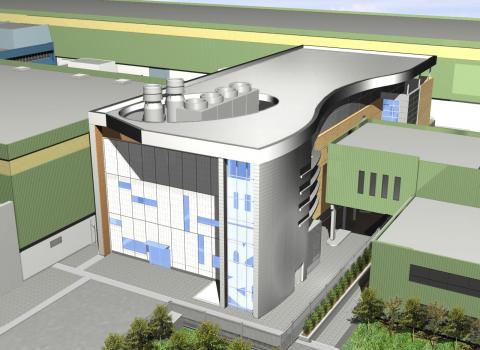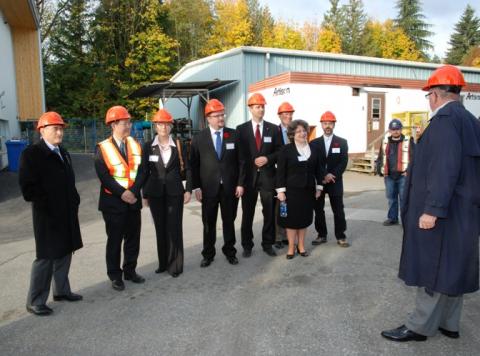

Right: The ARIEL Facility
Below: Video of the Research Facility
Starting today, the first of 300 B.C. workers begin building a tunnel and lab that will be used to demonstrate new ways to solve medical isotope shortages, keep B.C. and Canada leading in particle and nuclear physics, and create 160 permanent jobs.
The $62.9-million project is underway at TRIUMF, Canada's national laboratory for particle and nuclear physics, with $30.7 million provided by the provincial government. By 2015, ARIEL is expected to demonstrate a new way to produce medical isotopes, which are used to diagnose and treat cancer, heart disease, Parkinson's and Alzheimer's.
ARIEL, which stands for Advanced Rare IsotopE Laboratory, features an underground beam tunnel surrounding a next-generation linear accelerator, or e-linac. The e-linac is being designed and built by a 13-university consortium led by the University of Victoria. The team is also collaborating with researchers in India, Germany, the U.S. and the U.K.
The e-linac will produce intense beams of particles to create isotopes, which are variants of atoms of a particular chemical element, with differing numbers of neutrons. It will use new technology developed in B.C. that produces some of the most powerful beams in the world: up to the equivalent of 5,000 light bulbs concentrated in one square centimetre.
Isotopes are made at only a handful of facilities worldwide, and demand is expected to escalate in coming years. ARIEL will allow TRIUMF to broaden its research in studying and producing isotopes. The technology may also be used for such things as reducing pollution from coal-fired plants and producing fertilizers from chimney flue gases.
The heart of the linear accelerator is a superconducting radio frequency cavity, a new and highly efficient technology for accelerating particle beams. Only five groups in the world have the ability to make them, and one is a partnership between TRIUMF and PAVAC Industries in Richmond.
TRIUMF attracts top scientists from around the world to work together on research related to particle and nuclear physics, molecular and materials science, and nuclear medicine. It is owned and operated by a consortium of 17 Canadian universities and is located on the University of B.C.'s Vancouver campus.
In addition to the Province's $30.7 million, ARIEL is also being supported by $14.4 million that includes nearly $13 million in federal funding from the National Research Council toward TRIUMF's core operating budget, and contributions from partners in the U.S. and India. China has also expressed interest in investing in developing ARIEL further. In addition, the Canada Foundation for Innovation provided $17.8 million, which will help fund the e-linac portion of the project led by the University of Victoria.
